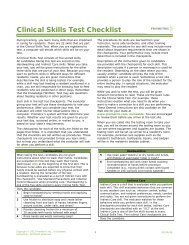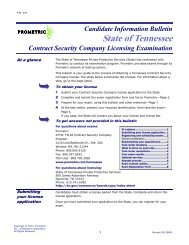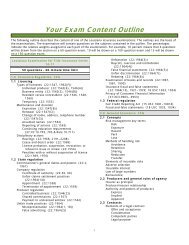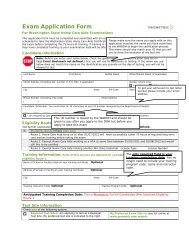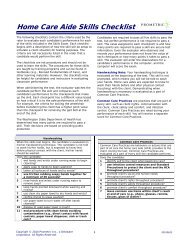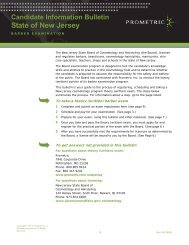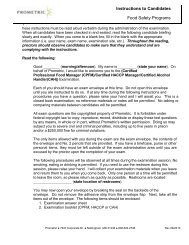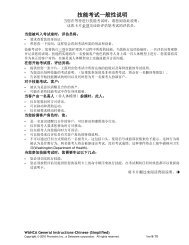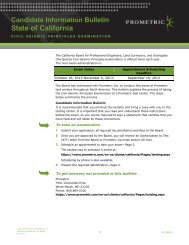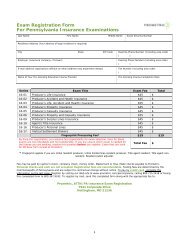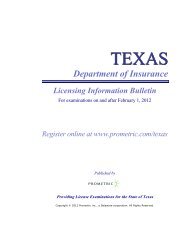English - Prometric
English - Prometric
English - Prometric
You also want an ePaper? Increase the reach of your titles
YUMPU automatically turns print PDFs into web optimized ePapers that Google loves.
Conflicts of Interest and<br />
Corporate Opportunities<br />
Avoid actual and potential conflicts of interest in performing your duties as a<br />
<strong>Prometric</strong> employee and do not advance personal interests at the expense<br />
of <strong>Prometric</strong>.<br />
As an employee, we expect that you will act in the best interests of <strong>Prometric</strong><br />
and avoid conflicts of interest. A conflict of interest may arise whenever a<br />
personal interest interferes – or even appears to interfere with – the interests<br />
of <strong>Prometric</strong>. While we respect your right to manage your personal affairs and<br />
investments and we do not wish to intrude on your personal life, <strong>Prometric</strong><br />
employees should place the Company’s interest in any business transaction<br />
ahead of any personal interest or gain.<br />
To avoid conflicts of interest, you should identify potential conflicts when they<br />
arise and notify your manager if you are unsure whether a relationship or<br />
transaction poses a conflict. Your manager will be able to pre-clear or resolve<br />
certain conflicts, or will be able to contact someone else at the Company who<br />
can. The following are examples of conflicts of interest that could arise, and are<br />
prohibited unless they have been pre-cleared or resolved in advance:<br />
• You or someone with a close relationship with you owns more than 1% of a<br />
competitor’s, customer’s or supplier’s stock,<br />
• You or someone with a close relationship with you receives improper<br />
personal benefits (such as cash, gifts, entertainment, services or<br />
discounts) as a result of your position at <strong>Prometric</strong>,<br />
• You work at an outside job, or serve as an officer, director or consultant to<br />
another company that interferes with your ability to do your job at<br />
<strong>Prometric</strong>,<br />
• You participate in a business transaction or opportunity to your personal<br />
advantage based on information or relationships developed or discovered<br />
in your job at <strong>Prometric</strong>, or<br />
• You have a spouse, partner or family member that is in a direct reporting<br />
relationship with you, or you have the ability to supervise, review or<br />
influence the job evaluation, hiring, pay or benefits of any spouse, partner<br />
or family member who also works at <strong>Prometric</strong>.<br />
Loans to, or guarantees of obligations of <strong>Prometric</strong> executive officers, directors<br />
and their family members are prohibited.<br />
Keep in mind that not all conflicts are prohibited and the list above does not<br />
address every example. Some conflicts are permissible if they are disclosed and<br />
approved. Because it is impossible to describe every potential conflict, we rely<br />
on your commitment to exercise sound judgment and to seek advice when<br />
appropriate. If you need advice on whether a particular activity is a conflict of<br />
interest, please contact your manager of the Legal Department.<br />
Q: Can I take on another job<br />
for times I’m not working at<br />
<strong>Prometric</strong>?<br />
A: This has the potential to be a<br />
conflict of interest, depending on<br />
the nature of the business of the<br />
second job and your involvement.<br />
Any second job must be<br />
separated from your position at<br />
the Company, and outside work<br />
may not be done on Company<br />
time or using Company<br />
equipment, property or supplies.<br />
Your second job must not interfere<br />
with or prevent you from devoting<br />
the time and effort needed to fulfill<br />
your primary duties and<br />
obligations as a <strong>Prometric</strong><br />
employee.<br />
Q: What does “close<br />
relationship” mean for purposes<br />
of this Code?<br />
A: You are always presumed to<br />
be in a “close relationship” with<br />
members of your immediate<br />
family. If your relationship with a<br />
cousin, more distant relative or<br />
friend could influence your<br />
objectivity, you should assume<br />
that you have a “close<br />
relationship” with that person as<br />
well.<br />
8



